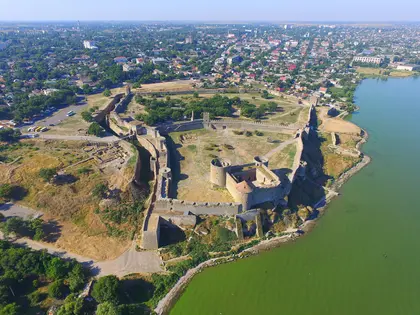The most popular Ukrainian highway in the summertime was always the one connecting Kyiv to Odesa – the road to the seaside. But on these hot days, the Odesa Highway is eerily empty - in both directions. Gone are the kilometer-long traffic jams and the queues at gas stations and bustling coffee shops. You only need to slow down at the occasional checkpoints, guarded by military personnel.
As you drive, it feels like everyone has left and gone somewhere else. Only the carefully cultivated fields of sunflowers and wheat on both sides of the road indicate that life goes on here – at least agricultural life.
JOIN US ON TELEGRAM
Follow our coverage of the war on the @Kyivpost_official.
“Our fuel sales now are one-fifth of what they were at the beginning of the war,” a gas station attendant complains.
At the next gas station, approaching Odesa, its three employees sit looking bored without any work to do.
As soon as we enter the Odesa region, we receive an SMS from the regional military administration. It is to remind us that walking along the coastline, swimming, and fishing in the Black Sea is prohibited, except at officially opened beaches inside Odesa, because of mines and bacteriological danger.
But we are not going to the Black Sea. We turn west towards the fortress town of Bilhorod-Dnistrovsky and then northwest, towards Moldova, into the Bessarabia steppe.
In the spring and summer of last year, Bilhorod-Dnistrovsky and the surrounding resort villages were the targets of Russian drone and missile attacks, while the Ukrainian military shot down a Russian aircraft that was trying to destroy the local power plant.

NATO, Ukraine to Meet Tuesday Over Russian Missile Strike
These days the city is calmer – perhaps too calm. Economic life has come to a practical standstill. There is little activity in one of the city’s main industrial enterprises - the Bilhorod-Dnistrovsky seaport.
The port is state-owned and the state is trying hard to sell it into private hands. Since March of this year, the State Property Fund has put it up for auction five times, but no one wants to participate in this auction. Now it has again been put up for auction - for the sixth time. The starting price has been reduced by half, but this hasn’t persuaded anyone to buy it – not while there is a war on.
Another nearby port seems to be more fortunate. This is the Ust-Danube seaport near the town of Kiliya. It was recently sold at auction for three times the original starting price. The buyer, a fertilizer company, took out a €6 million (Hr. 240 million) bank loan for the purchase. But there is a problem. The State Property Fund is delaying the registration of ownership and the deal itself is now in question. It seems the State Property Fund fears that the buyer “Elixir Ukraine” could refuse to handle the cargo of other companies. You have to ask why weren’t these issues agreed on and specified in the contract before the purchase? Are there really not enough lawyers in the state property fund? Or have its best lawyers been mobilized?
Elixir-Ukraine management is now considering terminating the deal and returning its funds to the bank. Some of the seaport equipment included in the auction documentation – for example, two floating cranes – have already been sunk by Russian artillery and missiles. The buyer was planning to raise and restore the sunken equipment. Planning an operation like that during a war must surely count as heroism – not the same heroism as shown by the tens of thousands of Ukrainian soldiers who have received medals (many thousands posthumously) but, heroism nonetheless.
Recently, conversations between Ukrainian civilians about its soldier heroes have been replaced by a lot of talk concerning the previously little-known businessman and blogger Oleksiy Tolkachev.
“You can kick me, but I will say it! Ukrainians deserved this war with Russia and it is a consequence of the previous 30 years of independence – a period of mismanagement, selfishness, theft, and sloppiness,” he wrote on Facebook. “We don't have a culture of cooperation and gratitude. We have a cult of hate. We have a toxic social environment… Unfortunately, so far only a small part of society is demonstrating change as if some Atlanteans are holding the country on their shoulders...”
Interestingly, in his statement, Tolkachev never mentioned the word “corruption” and focused his criticism on the “national qualities of the Ukrainian people” rather than on the country’s political elite.
Tolkachev’s verbose “cry from the heart” has clearly touched a nerve among thinkers in Ukrainian society and, as predicted by Tolkachev himself, has resulted in a wave of hate and criticism against him. However, a considerable minority of active Ukrainians support his views. The need to show appreciation for help received has become a separate discussion with activists already proposing a gratitude rally to honor those countries that continue to support Ukraine with weapons and finances.
I am not sure that the idea of "Gratitude Rallies" will take root in the minds of Ukraine’s political elite. This Independence Day focused on the changes made to the largest monument in Ukraine - the “Motherland” statue. The monument was erected in 1982, bearing the coat of arms of the Soviet Union. On Aug.24 this year that symbol was finally removed and replaced with the coat of arms of Ukraine – the “tryzub” or trident.
Now the 102-meter steel and titanium statue of a warlike woman –turned with her face, sword, and shield towards Moscow, finally, truly represents our nation and our love of monumental symbolism.
You can also highlight the text and press Ctrl + Enter






